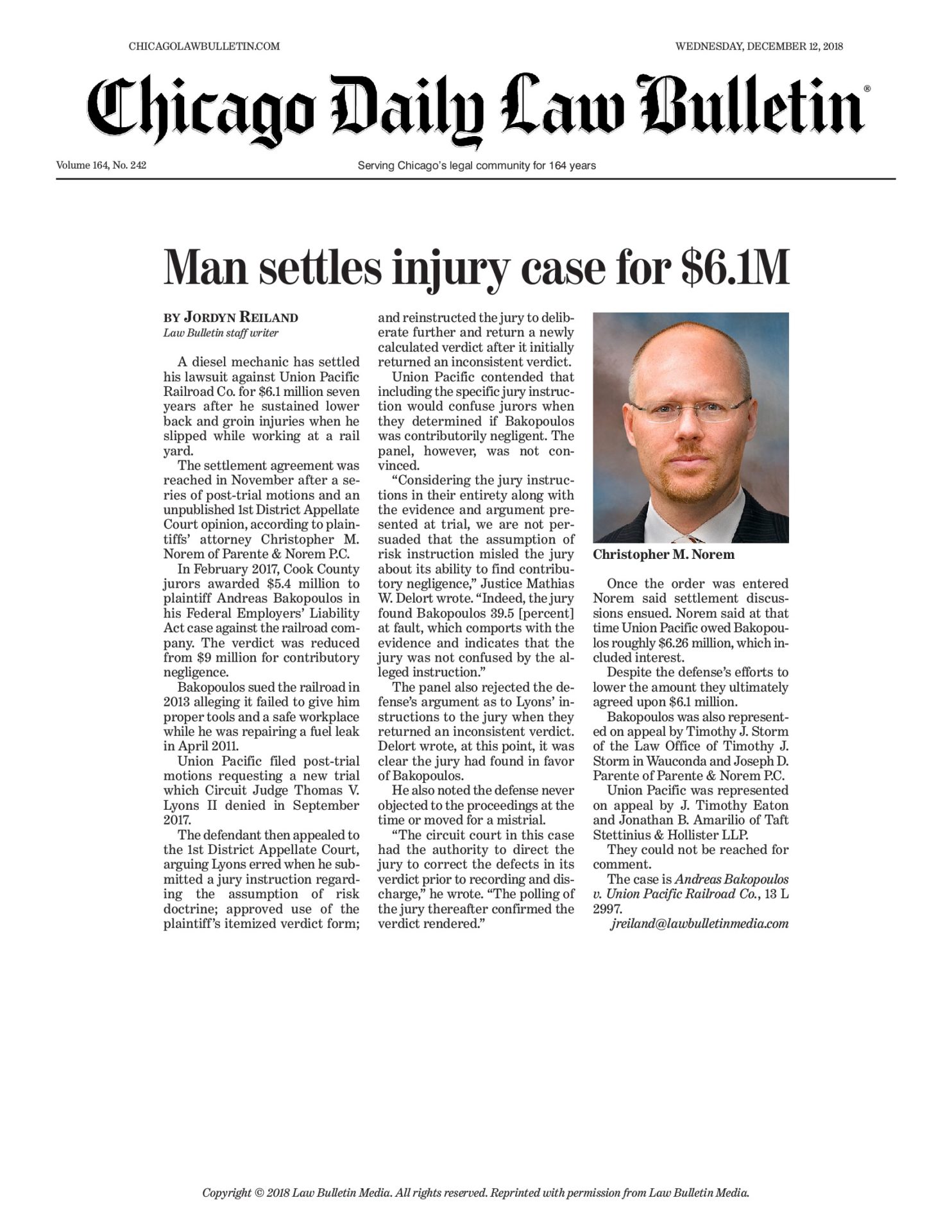
Man settles injury case for $6.1M, including $700K in post judgment interest, after the verdict was affirmed by the Appellate court.
Man settles injury case for $6.1 Million
BY JORDYN REILAND
Law Bulletin staff writer
A diesel mechanic has settled his lawsuit against Union Pacific Railroad Co. for $6.1 million seven years after he sustained lower back and groin injuries when he slipped while working at a rail yard.
The settlement agreement was reached in November after a series of post-trial motions and an unpublished 1st District Appellate Court opinion, according to plaintiffs’ attorney Christopher M. Norem of Parente & Norem P.C.
In February 2017, Cook County jurors awarded $5.4 million to plaintiff Andreas Bakopoulos in his Federal Employers’ Liability
Act case against the railroad company. The verdict was reduced from $9 million for contributory negligence. Bakopoulos sued the railroad in 2013 alleging it failed to give him proper tools and a safe workplace while he was repairing a fuel leak in April 2011.
Union Pacific filed post-trial motions requesting a new trial which Circuit Judge Thomas V. Lyons II denied in September
2017.
The defendant then appealed to the 1st District Appellate Court, arguing Lyons erred when he submitted a jury instruction regarding the assumption of risk doctrine; approved use of the plaintiff’s itemized verdict form; and reinstructed the jury to deliberate further and return a newly calculated verdict after it initially returned an inconsistent verdict.
Union Pacific contended that including the specific jury instruction would confuse jurors when they determined if Bakopoulos was contributorily negligent. The panel, however, was not convinced. “Considering the jury instructions in their entirety along with the evidence and argument presented at trial, we are not persuaded that the assumption of risk instruction misled the jury about its ability to find contributory negligence,” Justice Mathias W. Delort wrote. “Indeed, the jury found Bakopoulos 39.5 [percent] at fault, which comports with the evidence and indicates that the jury was not confused by the alleged instruction.”
The panel also rejected the defense’s argument as to Lyons’ instructions to the jury when they returned an inconsistent verdict.
Delort wrote, at this point, it was clear the jury had found in favor of Bakopoulos.
He also noted the defense never objected to the proceedings at the time or moved for a mistrial.
“The circuit court in this case had the authority to direct the jury to correct the defects in its verdict prior to recording and discharge,” he wrote. “The polling of the jury thereafter confirmed the verdict rendered.”
Once the order was entered Norem said settlement discussions ensued. Norem said at that time Union Pacific owed Bakopoulos roughly $6.26 million, which included interest.
Despite the defense’s efforts to lower the amount they ultimately agreed upon $6.1 million.
Bakopoulos was also represented on appeal by Timothy J. Storm of the Law Office of Timothy J. Storm in Wauconda and Joseph D. Parente of Parente & Norem P.C.
Union Pacific was represented on appeal by J. Timothy Eaton and Jonathan B. Amarilio of Taft Stettinius & Hollister LLP.
They could not be reached for comment.
The case is Andreas Bakopoulos v. Union Pacific Railroad Co., 13 L 2997. jreiland@lawbulletinmedia.com
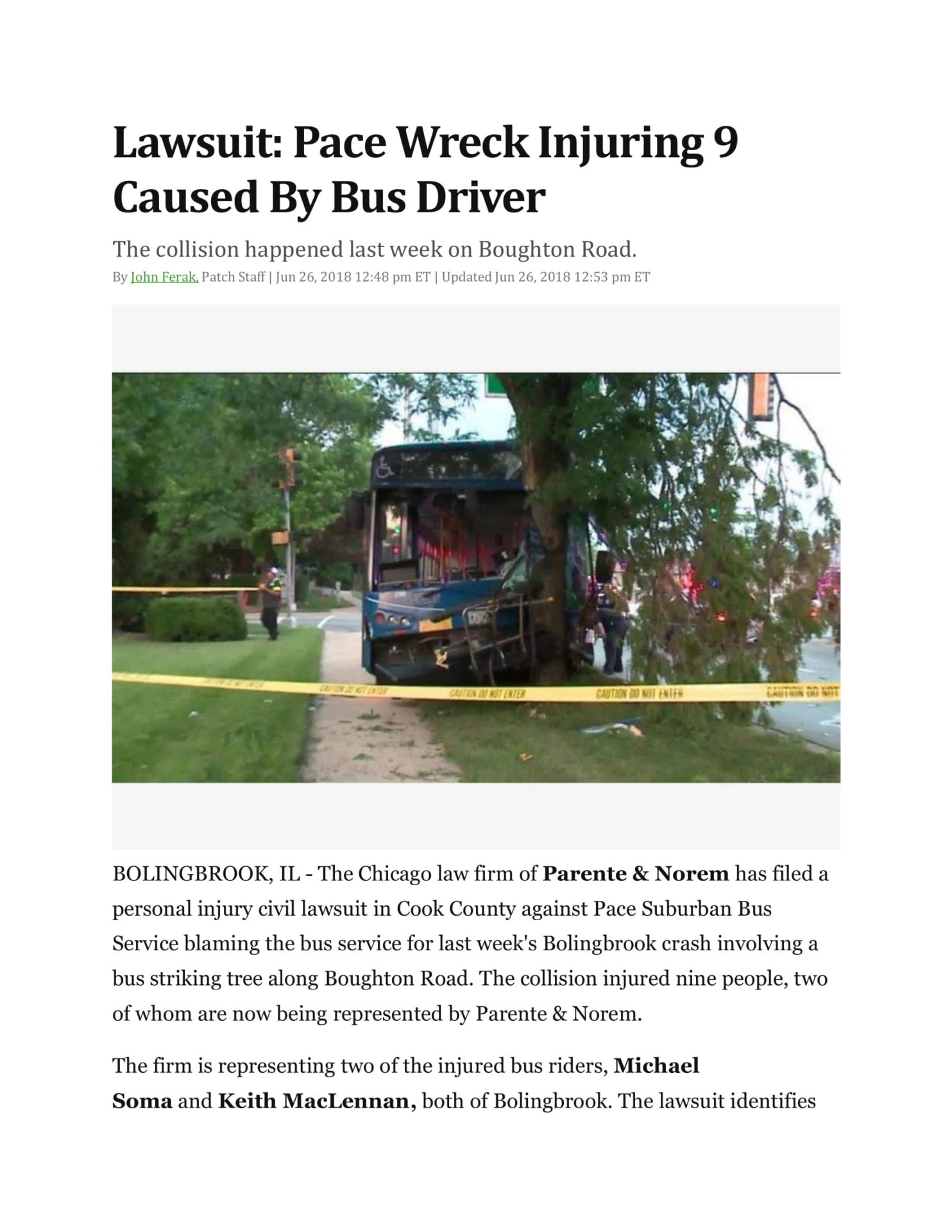
Pace Wreck Injuring 9 Caused By Bus Driver
Lawsuit: Pace Wreck Injuring 9 Caused By Bus Driver
The collision happened last week on Boughton Road.
By John Ferak, Patch Staff | Jun 26, 2018 12:48 pm ET | Updated Jun 26, 2018 12:53 pm ET
BOLINGBROOK, IL – The Chicago law firm of Parente & Norem has filed a personal injury civil lawsuit in Cook County against Pace Suburban Bus Service blaming the bus service for last week’s Bolingbrook crash involving a bus striking tree along Boughton Road. The collision injured nine people, two of whom are now being represented by Parente & Norem.
The firm is representing two of the injured bus riders, Michael Soma and Keith MacLennan, both of Bolingbrook. The lawsuit identifies the Pace driver as Donnah Bufkin, a resident of Sauk Village. Another defendant in the lawsuit is Bolingbrook resident Jocelyn Williams, whose car collided with the bus at the intersection of Boughton Road and Winston Drive, according to the filing.
“Plaintiff Keith MacLennan (was) thrown forward from his seat with great force and violence, causing (him) to sustain catastrophic injuries, both internally and externally … he has been unable to follow his usual occupation for a period of time, he has and will continue to suffer mental pain and anguish.”
ORIGINAL STORY: Bolingbrook Pace Bus Crash Injures 9
An identical complaint is outlined regarding the injuries to Soma.
According to the lawsuit, this is what happened around 7:10 p.m. June 18 in Bolingbrook:
Bufkin was driving the Pace bus west on Boughton approaching the intersection of Winston Drive where the posted speed limit is 40 mph.
Bufkin “entered the intersection of Boughton Road and Winston Drive when the traffic signal was not green.”
Williams was driving her car east on Boughton and she “attempted to make her left hand turn onto Winston Drive when the traffic signal for eastbound traffic turned yellow and then to red as Williams began to make her turn in order to clear the intersection.”
Bufkin, operating the Pace bus, “entered the intersection … and collided with the motor vehicle operated by defendant, Joceyln Williams with extreme force and violence.”
The bus veered off the roadway, striking a tree on the west side of Boughton Road.
The law firm of Parente & Norem indicated that it also plans to file a court motion seeking an emergency protection order to preserve the damaged Pace bus as well as the video and data related to the crash.
The lawsuit blames the Pace bus driver for not yielding the right of way and for not taking evasive maneuvers to avoid colliding with Williams’ car.
Main Image via Parente & Norem, P.C.
© 2018 Patch Media. All Rights Reserved.
https://patch.com/illinois/bolingbrook/lawsuit-pace-wreck-injuring-9-caused-bus-driver
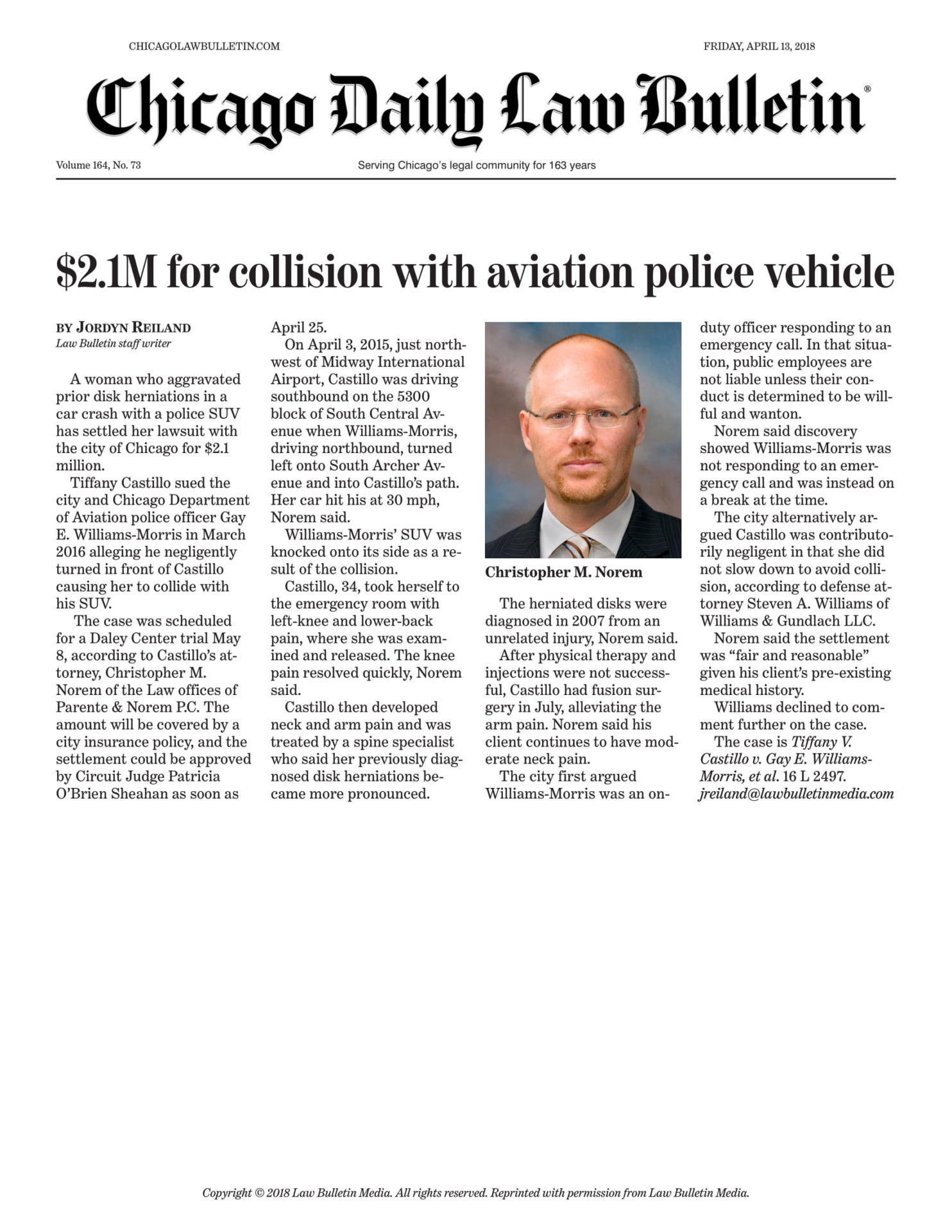
$2.1M for collision with aviation police vehicle
BY JORDYN REILAND
Law Bulletin staff writer
A woman who aggravated prior disk herniations in a car crash with a police SUV has settled her lawsuit with the city of Chicago for $2.1 million.
Tiffany Castillo sued the city and Chicago Department of Aviation police officer Gay E. Williams-Morris in March 2016 alleging he negligently turned in front of Castillo causing her to collide with his SUV.
The case was scheduled for a Daley Center trial May 8, according to Castillo’s attorney, Christopher M. Norem of the Law offices of Parente & Norem P.C. The amount will be covered by a city insurance policy, and the settlement could be approved by Circuit Judge Patricia O’Brien Sheahan as soon as April 25.
On April 3, 2015, just northwest of Midway International Airport, Castillo was driving southbound on the 5300 block of South Central Avenue when Williams-Morris, driving northbound, turned left onto South Archer Avenue and into Castillo’s path. Her car hit his at 30 mph, Norem said.
Williams-Morris’ SUV was knocked onto its side as a result of the collision.
Castillo, 34, took herself to the emergency room with left-knee and lower-back pain, where she was examined and released. The knee pain resolved quickly, Norem said.
Castillo then developed neck and arm pain and was treated by a spine specialist who said her previously diagnosed disk herniations became more pronounced.
The herniated disks were diagnosed in 2007 from an unrelated injury, Norem said.
After physical therapy and injections were not successful, Castillo had fusion surgery in July, alleviating the arm pain. Norem said his client continues to have moderate neck pain.
The city first argued Williams-Morris was an on-duty officer responding to an emergency call. In that situation, public employees are not liable unless their conduct is determined to be willful and wanton.
Norem said discovery showed Williams-Morris was not responding to an emergency call and was instead on a break at the time.
The city alternatively argued Castillo was contributorily negligent in that she did not slow down to avoid collision, according to defense attorney Steven A. Williams of Williams & Gundlach LLC.
Norem said the settlement was “fair and reasonable” given his client’s pre-existing medical history.
Williams declined to comment further on the case.
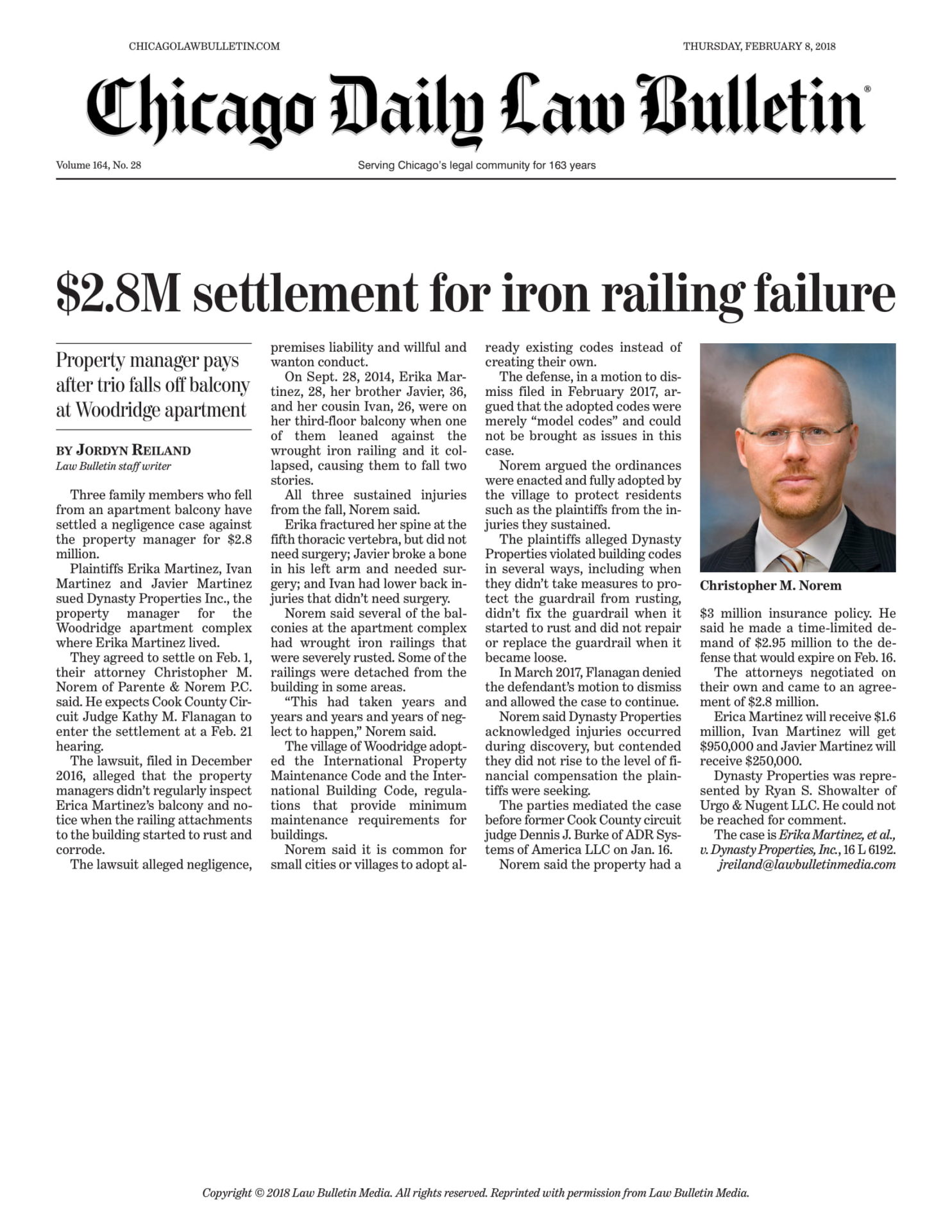
$2.8M settlement for iron railing failure
Property manager pays after trio falls off balcony at Woodridge apartment
BY JORDYN REILAND
Law Bulletin staff writer
Three family members who fell from an apartment balcony have settled a negligence case against the property manager for $2.8 million.
Plaintiffs Erika Martinez, Ivan Martinez and Javier Martinez sued Dynasty Properties Inc., the property manager for the Woodridge apartment complex where Erika Martinez lived.
They agreed to settle on Feb. 1, their attorney Christopher M. Norem of Parente & Norem P.C. said. He expects Cook County Circuit Judge Kathy M. Flanagan to enter the settlement at a Feb. 21 hearing.
The lawsuit, filed in December 2016, alleged that the property managers didn’t regularly inspect Erica Martinez’s balcony and notice when the railing attachments to the building started to rust and corrode.
The lawsuit alleged negligence,
premises liability and willful and wanton conduct.
On Sept. 28, 2014, Erika Martinez, 28, her brother Javier, 36, and her cousin Ivan, 26, were on her third-floor balcony when one of them leaned against the wrought iron railing and it collapsed, causing them to fall two stories.
All three sustained injuries from the fall, Norem said.
Erika fractured her spine at the fifth thoracic vertebra, but did not need surgery; Javier broke a bone in his left arm and needed surgery; and Ivan had lower back injuries that didn’t need surgery.
Norem said several of the balconies at the apartment complex had wrought iron railings that were severely rusted. Some of the railings were detached from the building in some areas.
“This had taken years and years and years and years of neglect to happen,” Norem said.
The village of Woodridge adopted the International Property Maintenance Code and the International Building Code, regulations that provide minimum maintenance requirements for buildings.
Norem said it is common for small cities or villages to adopt already existing codes instead of creating their own.
The defense, in a motion to dismiss filed in February 2017, argued that the adopted codes were merely “model codes” and could not be brought as issues in this case.
Norem argued the ordinances were enacted and fully adopted by the village to protect residents such as the plaintiffs from the injuries they sustained.
The plaintiffs alleged Dynasty Properties violated building codes in several ways, including when they didn’t take measures to protect the guardrail from rusting, didn’t fix the guardrail when it started to rust and did not repair or replace the guardrail when it became loose.
In March 2017, Flanagan denied the defendant’s motion to dismiss and allowed the case to continue.
Norem said Dynasty Properties acknowledged injuries occurred during discovery, but contended they did not rise to the level of financial compensation the plaintiffs were seeking.
The parties mediated the case before former Cook County circuit judge Dennis J. Burke of ADR Systems of America LLC on Jan. 16.
Norem said the property had $3 million insurance policy. He said he made a time-limited demand of $2.95 million to the defense that would expire on Feb. 16.
The attorneys negotiated on their own and came to an agreement of $2.8 million.
Erica Martinez will receive $1.6 million, Ivan Martinez will get $950,000 and Javier Martinez will receive $250,000.
Dynasty Properties was represented by Ryan S. Showalter of Urgo & Nugent LLC. He could not be reached for comment.
The case is Erika Martinez, et al., v. Dynasty Properties, Inc., 16 L 6192.jreiland@lawbulletinmedia.com
Copyright © 2018 Law Bulletin Media. All rights reserved. Reprinted with permission from Law Bulletin Media.
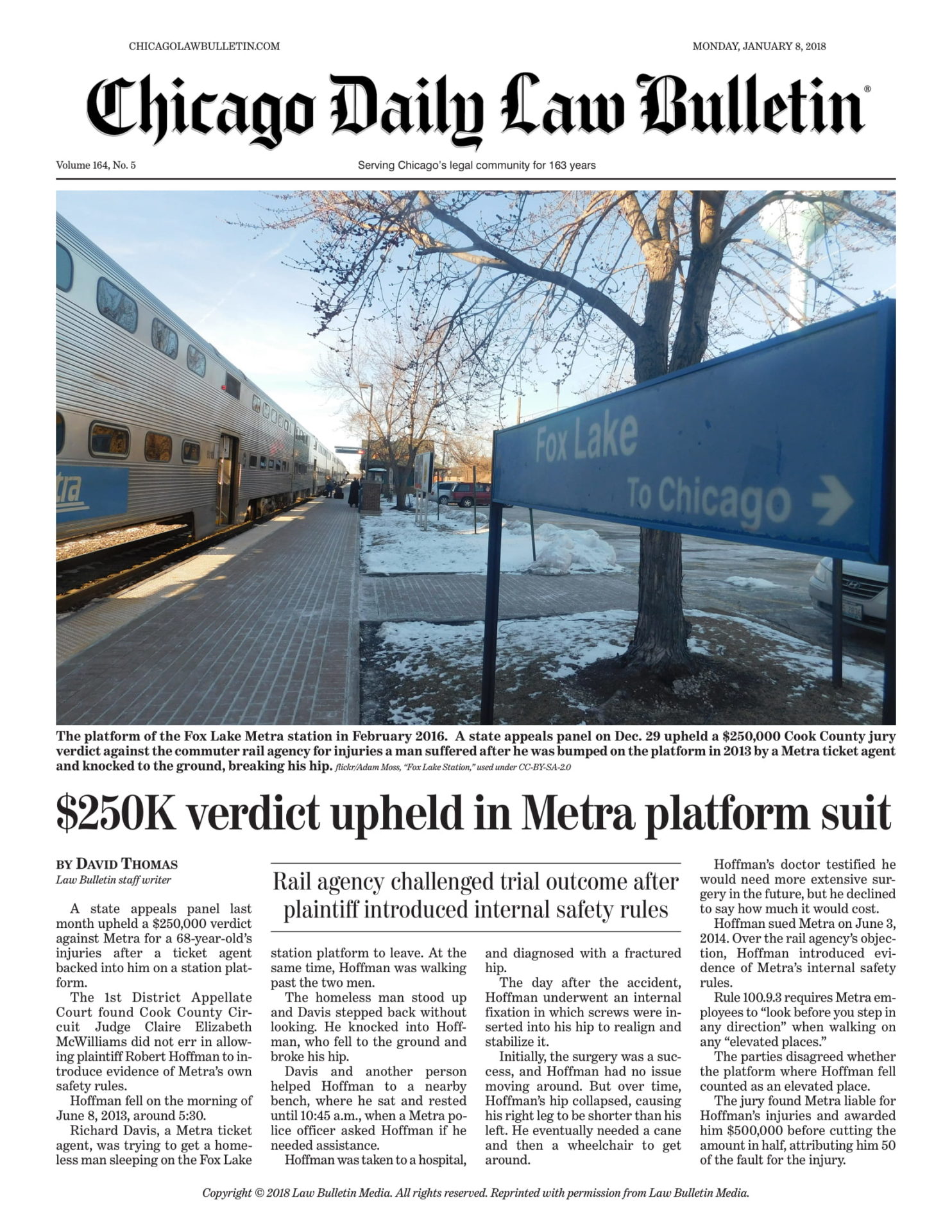
$250K verdict upheld in Metra platform suit
BY DAVID THOMAS
Law Bulletin staff writer
A state appeals panel last month upheld a $250,000 verdict against Metra for a 68-year-old’s injuries after a ticket agent backed into him on a station platform.
The 1st District Appellate Court found Cook County Circuit Judge Claire Elizabeth McWilliams did not err in allowing plaintiff Robert Hoffman to introduce evidence of Metra’s own safety rules.
Hoffman fell on the morning of June 8, 2013, around 5:30.
Richard Davis, a Metra ticket agent, was trying to get a homeless man sleeping on the Fox Lake station platform to leave. At the same time, Hoffman was walking past the two men.
The homeless man stood up and Davis stepped back without looking. He knocked into Hoffman, who fell to the ground and broke his hip.
Davis and another person helped Hoffman to a nearby bench, where he sat and rested until 10:45 a.m., when a Metra police officer asked Hoffman if he needed assistance.
Hoffman was taken to a hospital and diagnosed with a fractured hip.
The day after the accident, Hoffman underwent an internal fixation in which screws were inserted into his hip to realign and stabilize it.
Initially, the surgery was a success, and Hoffman had no issue moving around. But over time, Hoffman’s hip collapsed, causing his right leg to be shorter than his left. He eventually needed a cane and then a wheelchair to get around.
Hoffman’s doctor testified he would need more extensive surgery in the future, but he declined to say how much it would cost.
Hoffman sued Metra on June 3, 2014. Over the rail agency’s objection, Hoffman introduced evidence of Metra’s internal safety rules.
Rule 100.9.3 requires Metra employees to “look before you step in any direction” when walking on any “elevated places.”
The parties disagreed whether the platform where Hoffman fell counted as an elevated place.
The jury found Metra liable for Hoffman’s injuries and awarded him $500,000 before cutting the amount in half, attributing him 50 of the fault for the injury.
“[T]he jury was free to accept Davis’ testimony that the particular rule in question did not apply to him and that he also had ‘a valid reason’ for moving quickly in this particular situation, namely, because a homeless man was suddenly standing up in front of him,” Justice Robert E. Gordon wrote. “By the same token, the jurors were also free to reject it and consider the rule, ‘along with other evidence,’ in reaching their determination that defendant was 50 [percent] responsible for the incident.”
According to Matthew J. Coleman, an associate at the Law Offices of Parente & Norem P.C. and one of Hoffman’s attorneys, the question of the platform’s elevation was not a major factor.
Matthew J. Coleman
“It really didn’t come into play that much. It’s really whether I could confront Rich Davis with the safety rules,” Coleman said. Davis acknowledged the rule’s existence, but argued it didn’t apply to him at the time.
Within the original $500,000 verdict before reduction, the jury awarded $70,000 for future medical expenses. Metra singled out that valuation on appeal.
But the panel rejected Metra’s argument that the $35,000 amount after reduction should be further reduced, finding no abuse of discretion by the trial court.
On appeal, Metra argued McWilliams erred in introducing the railroad’s internal safety rules, requiring a new trial. The rail agency argued the violation of an internal rule does not constitute negligence, although the 1st District panel noted Metra misquoted the decision it cited.
Under Morton v. City of Chicago, 286 Ill. App. 3d 444 (1997), the 1st District panel found that while an internal rule violation does not automatically translate to willful and wanton conduct, a jury can consider it as evidence. That is what the jury did in Hoffman’s case, Gordon wrote.
The panel found that even if McWilliams had erred in introducing the evidence, it would not have affected the jury’s decision.
Metra was represented by Associate General Counsel Kenneth Jones and attorney Jamie Victoria Harrmann.
Metra spokesman Michael Gillis said, “We’ll abide by the appellate decision.”
Hoffman was also represented by Jordan W. LaClair of Parente & Norem.
Justices Margaret Stanton McBride and David W. Ellis concurred with the opinion.
The case is Robert Hoffman v. Northeast Illinois Regional Commuter Railroad Corp., 2017 IL App (1st) 170537.
dthomas@lawbulletinmedia.com
Copyright © 2018 Law Bulletin Media. All rights reserved. Reprinted with permission from Law Bulletin Media.

$6.6 Mil awarded for O’Hare L crash
CHICAGOLAWBULLETIN.COM // In the News
Volume 163, No. 31 // WEDNESDAY, MAY 10, 2017
BY LAURAANN WOOD Law Bulletin staff writer
A Cook County jury has awarded $6.65 million to a woman who suffered several injuries when a Blue Line train derailed at the O’Hare station.
Plaintiff Yolanda Montes sued the Chicago Transit Authority in 2014, alleging it negligently failed to operate its rail system safely and ensure its train operator was not fatigued while on the clock.
Montes, a Transportation Security Administration employee, was riding in the train’s sixth car on her way to work around 2:50 a.m. on March 24, 2014, when the front of the train barreled past a protective bumper onto the station platform and came to rest halfway up the escalator into O’Hare International Airport.
Reports that came out days after the incident indicated the train’s operator said she fell asleep at the controls and didn’t wake up until the collision.
Montes’ head struck a metal pole and a train door in the incident, causing her to suffer neck pain, back pain and a concussion. But the impact also aggravated her previously existing asymptomatic degenerative disk disease and arthritis, said Christopher M. Norem, a partner at Parente & Norem P.C. who represented Montes.
She began treating her injuries conservatively immediately after Early-morning derailment caused injuries to TSA worker with existing back problems
the crash but decided to undergo surgery after more than a year of no response, Norem said. She received a one-level fusion in her neck in June 2015 and a two-level lumbar fusion in March, he said.
“This was a woman that was a [Transportation security officer] at O’Hare who had to handle bags. She had to twist and bend and lift,” Norem said. “She was able to do that without a problem in her life. Then this event happened, and we have this whole cascade of treatments.”
Montes’ neck surgery resolved her radiating arm pain, Norem said, but it did not treat the local neck pain. Now 37, Montes works as an administrative assistant with the TSA in a position that meets all of her permanent restrictions related to lifting, bending and standing, Norem said.
The CTA admitted negligence in the suit and acknowledged Montes’ neck pain, back pain and concussion. However, it denied that her aggravated degenerative disk and arthritis symptoms resulted from the train crash.
“They fought us tooth and nail on that,” Norem said, noting the CTA retained a medical expert to support its contention during trial.
To challenge that argument, Norem presented jurors with two options. He said the jury could find it more likely than not that the collision triggered his client’s aggravating symptoms, or it could accept the CTA’s contention that the crash didn’t cause the symptoms. Norem called that contention “the world’s biggest coincidence.”
The CTA was represented by its managing attorney Jade G. Simmons-Ford and senior attorney Calvin A. Townsend II. Townsend deferred comment to its media relations department, which declined to comment.
Norem said the parties did not engage in settlement discussions, but the CTA offered $600,000 to settle about two weeks before and then $2 million during their weeklong trial before Circuit Judge Arnette R. Hubbard.
On Friday, The jury awarded Montes $440,000 for past loss of a normal life, $840,000 for future loss of a normal life, $50,000 for disfigurement, $840,000 for past pain and suffering, $2.75 million for future pain and suffering, $617,000 for past medical expenses, $617,000 for future medical expenses and $500,000 for lost earnings.
Norem said his client is pleased with the jury’s verdict.
“She’s made the best out of a bad situation, but unfortunately her dreams of becoming a full time law enforcement officer are never going to come true,” he said. “But she’s satisfied with her outcome. She put her trust in the jury, and it made a fair and just decision for her.”
Parente & Norem associate Amanda M. Martin also represented Montes.
The case is Yolanda Montes v. Chicago Transit Authority, 14 L 4695.
Copyright © 2017 Law Bulletin Publishing Company. All rights reserved. Reprinted with permission from Law Bulletin Publishing Company.
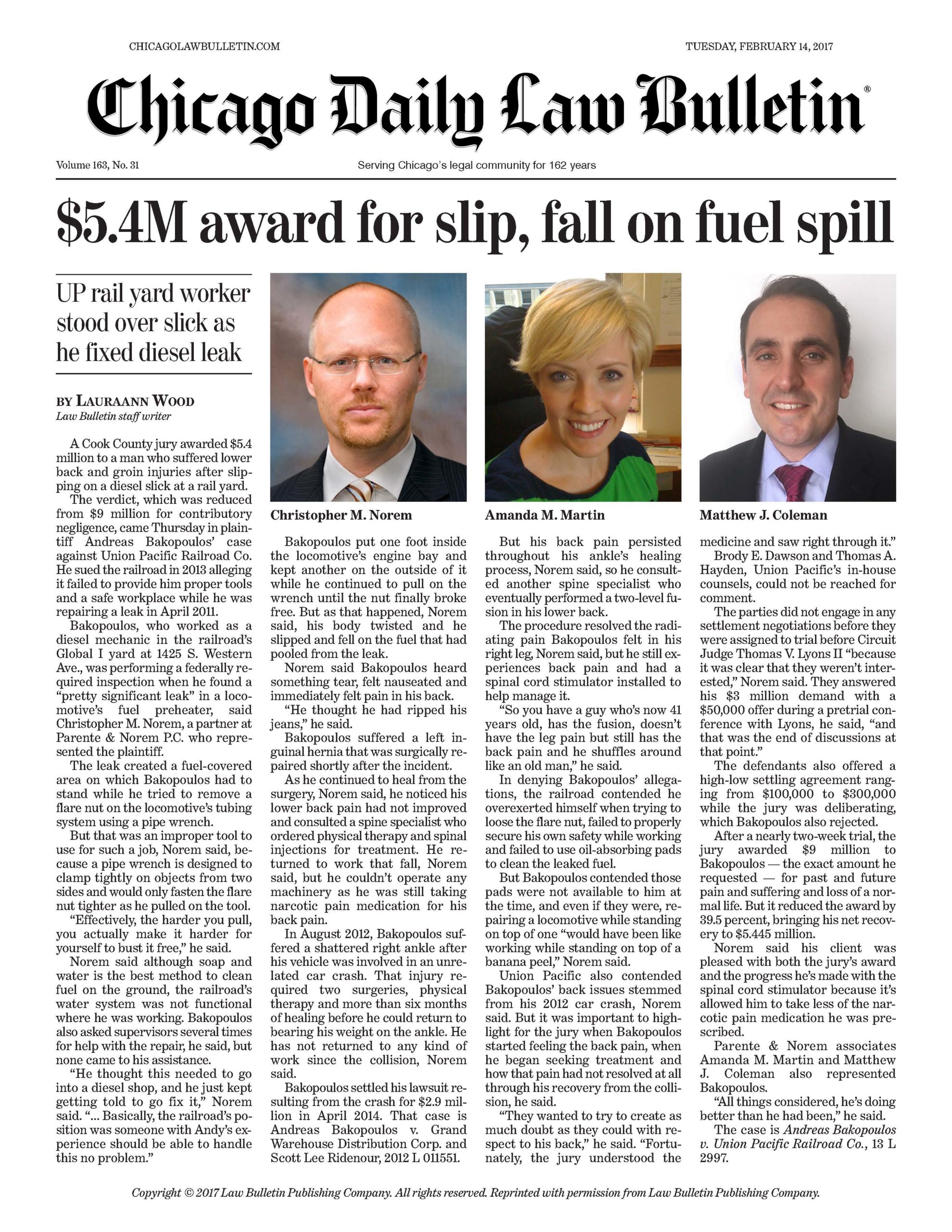
$5.4M Award for slip, fall on fuel spill
| https://pninjurylaw.com/parente-news-feb14-2017/ |
CHICAGOLAWBULLETIN.COM // In the News
Volume 163, No. 31 // TUESDAY, FEBRUARY 14, 2017
BY LAURAANN WOOD Law Bulletin staff writer
$5.445M net jury verdict against Union Pacific Rail Road for injured an
railroad worker brought under FELA.
37 year-old diesel mechanic was attempting to loosen a fitting on a fuel pre-heater with a pipe wrench
while standing in leaking diesel fuel when the fighting broke free causing him to twist and sustain an inguinal hernia along with a lumbar disk injury.
Plaintiff returned to work in a modified duty, but before having
back surgery was unfortunately in a serious car accident which fractured
his right ankle.
We obtained a $2.95M settlement for this man for his ankle injury.
Once he healed from the ankle fracture he returned to a spine surgeon and underwent a two-level lumbar fusion surgery on his back.
Union Pacific offered $50K during the start of the trial.
The jury awarded the entire $9M we requested of them and reduced it by 39.5% contributory negligence on the part of the mechanic, resulting in the net verdict of $5.445M or more than 100x the settlement offer at trial.
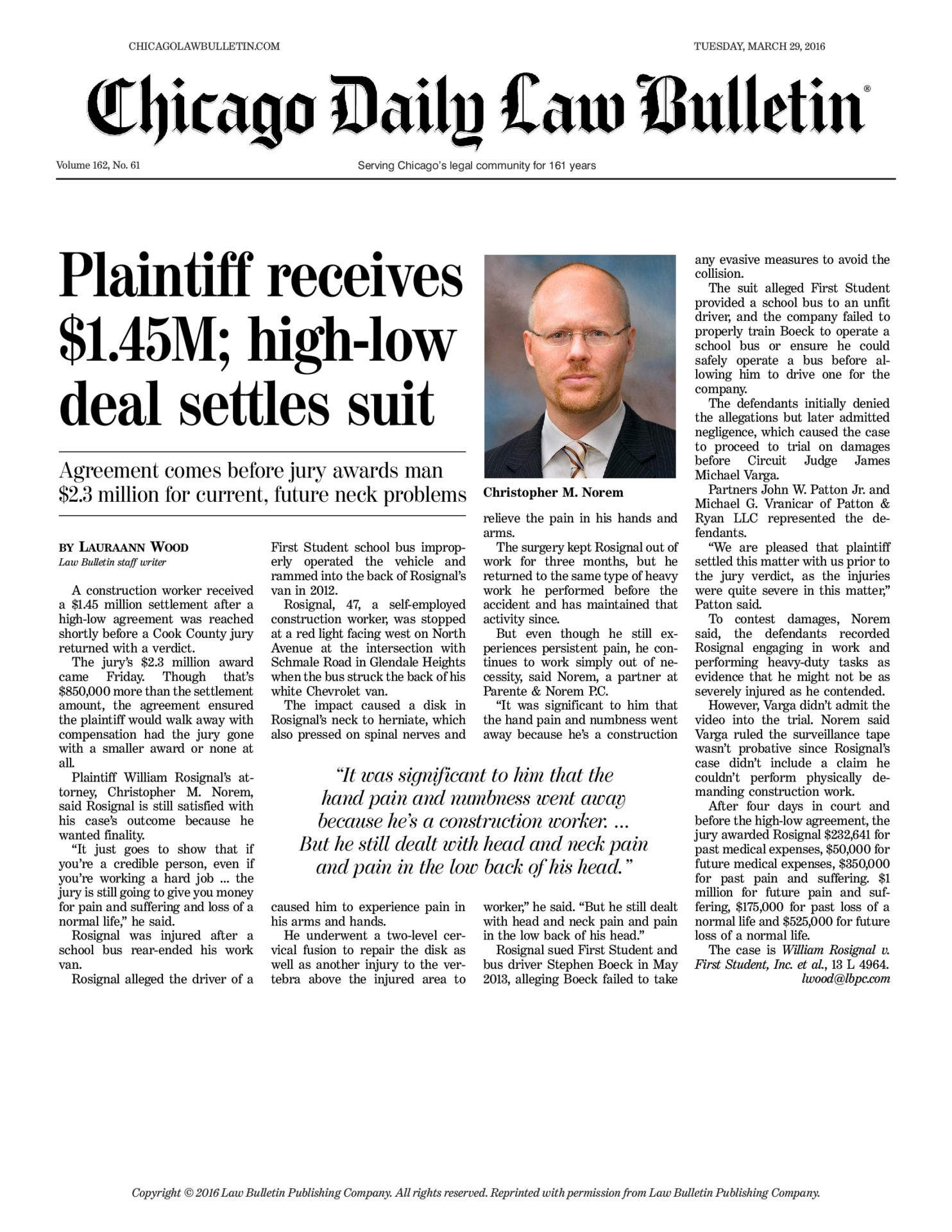
Plaintiff Receives $1.45M; High-Low Deal Settles Suit
BY LAURAANN WOOD Law Bulletin staff writer
A construction worker received a $1.45 million settlement after a high-low agreement was reached shortly before a Cook County jury returned with a verdict.
The jury’s $2.3 million award came Friday. Though that’s $850,000 more than the settlement amount, the agreement ensured the plaintiff would walk away with compensation had the jury gone with a smaller award or none at all.
Plaintiff William Rosignal’s attorney, Christopher M. Norem, said Rosignal is still satisfied with his case’s outcome because he wanted finality. “It just goes to show that if you ’re a credible person, even if you ’re working a hard job … the jury is still going to give you money for pain and suffering and loss of a normal life,” he said.
Rosignal was injured after a school bus rear-ended his work van.
Rosignal alleged the driver of a First Student school bus improperly operated the vehicle and rammed into the back of Rosignal’s van in 2012.
Rosignal, 47, a self-employed construction worker, was stopped at a red light facing west on North Avenue at the intersection with Schmale Road in Glendale Heights when the bus struck the back of his white Chevrolet van.
The impact caused a disk in Rosignal ’s neck to herniate, which also pressed on spinal nerves and caused him to experience pain in his arms and hands.
He underwent a two-level cervical fusion to repair the disk as well as another injury to the vertebra above the injured area to relieve the pain in his hands and arms.
The surgery kept Rosignal out of work for three months, but he returned to the same type of heavy work he performed before the accident and has maintained that activity since.
But even though he still experiences persistent pain, he continues to work simply out of necessity, said Norem, a partner at Parente & Norem P.C.
“It was significant to him that the hand pain and numbness went away because he’s a construction worker,” he said. “But he still dealt with head and neck pain and pain in the low back of his head.”
Rosignal sued First Student and bus driver Stephen Boeck in May 2013, alleging Boeck failed to take any evasive measures to avoid the collision .
The suit alleged First Student provided a school bus to an unfit driver, and the company failed to properly train Boeck to operate a school bus or ensure he could safely operate a bus before allowing him to drive one for the company.
The defendants initially denied the allegations but later admitted negligence, which caused the case to proceed to trial on damages before Circuit Judge James Michael Varga.
Partners John W. Patton Jr. and Michael G. Vranicar of Patton & Ryan LLC represented the defendants.
“We are pleased that plaintiff settled this matter with us prior to the jury verdict, as the injuries were quite severe in this matter,” Patton said.
To contest damages, Norem said, the defendants recorded Rosignal engaging in work and performing heavy-duty tasks as evidence that he might not be as severely injured as he contended.
However, Varga didn’t admit the video into the trial. Norem said Varga ruled the surveillance tape wasn’t probative since Rosignal’s case didn’t include a claim he couldn’t perform physically demanding construction work.
After four days in court and before the high-low agreement, the jury awarded Rosignal $232,641 for past medical expenses, $50,000 for future medical expenses, $350,000 for past pain and suffering. $1 million for future pain and suffering, $175,000 for past loss of a normal life and $525,000 for future loss of a normal life.
The case is William Rosignal v. First Student, Inc. et al., 13 L 4964.
———————————————————————-
CHICAGOLAWBULLETIN.COM // In the News
Volume 162, No. 61 // TUESDAY, MARCH 29, 2016
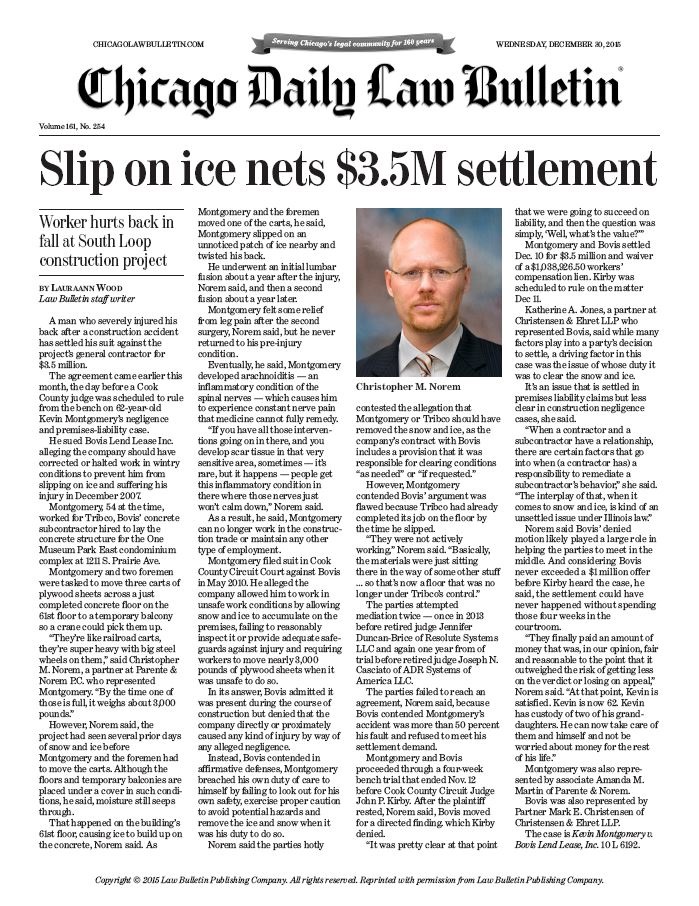
Slip on Ice Nets $3.5M settlement
BY LAURAANN WOOD Law Bulletin staff writer
A man who severely injured his back after a construction accident has settled his suit against the project’s general contractor for $3.5 million.
The agreement came earlier this month, the day before a Cook County judge was scheduled to rule from the bench on 62-year-old Kevin Montgomery’s negligence and premises-liability case.
He sued Bovis Lend Lease Inc. alleging the company should have corrected or halted work in wintry conditions to prevent him from slipping on ice and suffering his injury in December 2007.
Montgomery, 54 at the time, worked for Tribco, Bovis’ concrete subcontractor hired to lay the concrete structure for the One Museum Park East condominium complex at 1211 S. Prairie Ave.
Montgomery and two foremen were tasked to move three carts of plywood sheets across a just completed concrete floor on the 61st floor to a temporary balcony so a crane could pick them up.
“They’re like railroad carts, they’re super heavy with big steel wheels on them,” said Christopher M. Norem, a partner at Parente & Norem P.C. who represented Montgomery. “By the time one of those is full, it weighs about 3,000 pounds.”
However, Norem said, the project had seen several prior days of snow and ice before Montgomery and the foremen had to move the carts. Although the floors and temporary balconies are placed under a cover in such conditions, he said, moisture still seeps through.
That happened on the building’s 61st floor, causing ice to build up on the concrete, Norem said. As Montgomery and the foremen moved one of the carts, he said, Montgomery slipped on an unnoticed patch of ice nearby and twisted his back.
He underwent an initial lumbar fusion about a year after the injury, Norem said, and then a second fusion about a year later.
Montgomery felt some relief from leg pain after the second surgery, Norem said, but he never returned to his pre-injury condition.
Eventually, he said, Montgomery developed arachnoiditis — an inflammatory condition of the spinal nerves — which causes him to experience constant nerve pain that medicine cannot fully remedy.
“If you have all those interventions going on in there, and you develop scar tissue in that very sensitive area, sometimes — it’s rare, but it happens — people get this inflammatory condition in there where those nerves just won’t calm down,” Norem said.
As a result, he said, Montgomery can no longer work in the construction trade or maintain any other type of employment.
Montgomery filed suit in Cook County Circuit Court against Bovis in May 2010. He alleged the company allowed him to work in unsafe work conditions by allowing snow and ice to accumulate on the premises, failing to reasonably inspect it or provide adequate safeguards against injury and requiring workers to move nearly 3,000 pounds of plywood sheets when it was unsafe to do so.
In its answer, Bovis admitted it was present during the course of construction but denied that the company directly or proximately caused any kind of injury by way of any alleged negligence.
Instead, Bovis contended in affirmative defenses, Montgomery breached his own duty of care to himself by failing to look out for his own safety, exercise proper caution to avoid potential hazards and remove the ice and snow when it was his duty to do so.
Norem said the parties hotly contested the allegation that Montgomery or Tribco should have removed the snow and ice, as the company’s contract with Bovis includes a provision that it was responsible for clearing conditions “as needed” or “if requested.”
However, Montgomery contended Bovis’ argument was flawed because Tribco had already completed its job on the floor by the time he slipped.
“They were not actively working,” Norem said. “Basically, the materials were just sitting there in the way of some other stuff … so that’s now a floor that was no longer under Tribco’s control.”
The parties attempted mediation twice — once in 2013 before retired judge Jennifer Duncan-Brice of Resolute Systems LLC and again one year from of trial before retired judge Joseph N. Casciato of ADR Systems of America LLC.
The parties failed to reach an agreement, Norem said, because Bovis contended Montgomery’s accident was more than 50 percent his fault and refused to meet his settlement demand.
Montgomery and Bovis proceeded through a four-week bench trial that ended Nov. 12 before Cook County Circuit Judge John P. Kirby. After the plaintiff rested, Norem said, Bovis moved for a directed finding. which Kirby denied.
“It was pretty clear at that point that we were going to succeed on liability, and then the question was simply, ‘Well, what’s the value?’”
Montgomery and Bovis settled Dec. 10 for $3.5 million and waiver of a $1,038,926.50 workers’ compensation lien. Kirby was scheduled to rule on the matter Dec 11.
Katherine A. Jones, a partner at Christensen & Ehret LLP who represented Bovis, said while many factors play into a party’s decision to settle, a driving factor in this case was the issue of whose duty it was to clear the snow and ice.
It’s an issue that is settled in premises liability claims but less clear in construction negligence cases, she said.
“When a contractor and a subcontractor have a relationship, there are certain factors that go into when (a contractor has) a responsibility to remediate a subcontractor’s behavior,” she said. “The interplay of that, when it comes to snow and ice, is kind of an unsettled issue under Illinois law.”
Norem said Bovis’ denied motion likely played a large role in helping the parties to meet in the middle. And considering Bovis never exceeded a $1 million offer before Kirby heard the case, he said, the settlement could have never happened without spending those four weeks in the courtroom.
“They finally paid an amount of money that was, in our opinion, fair and reasonable to the point that it outweighed the risk of getting less on the verdict or losing on appeal,” Norem said. “At that point, Kevin is satisfied. Kevin is now 62. Kevin has custody of two of his granddaughters. He can now take care of them and himself and not be worried about money for the rest of his life.”
Montgomery was also represented by associate Amanda M. Martin of Parente & Norem.
Bovis was also represented by Partner Mark E. Christensen of Christensen & Ehret LLP.
The case is Kevin Montgomery v. Bovis Lend Lease, Inc. 10 L 6192.
———————————————————————-
CHICAGOLAWBULLETIN.COM // In the News
Volume 161, No. 254// WEDNESDAY, DECEMBER 30, 2015
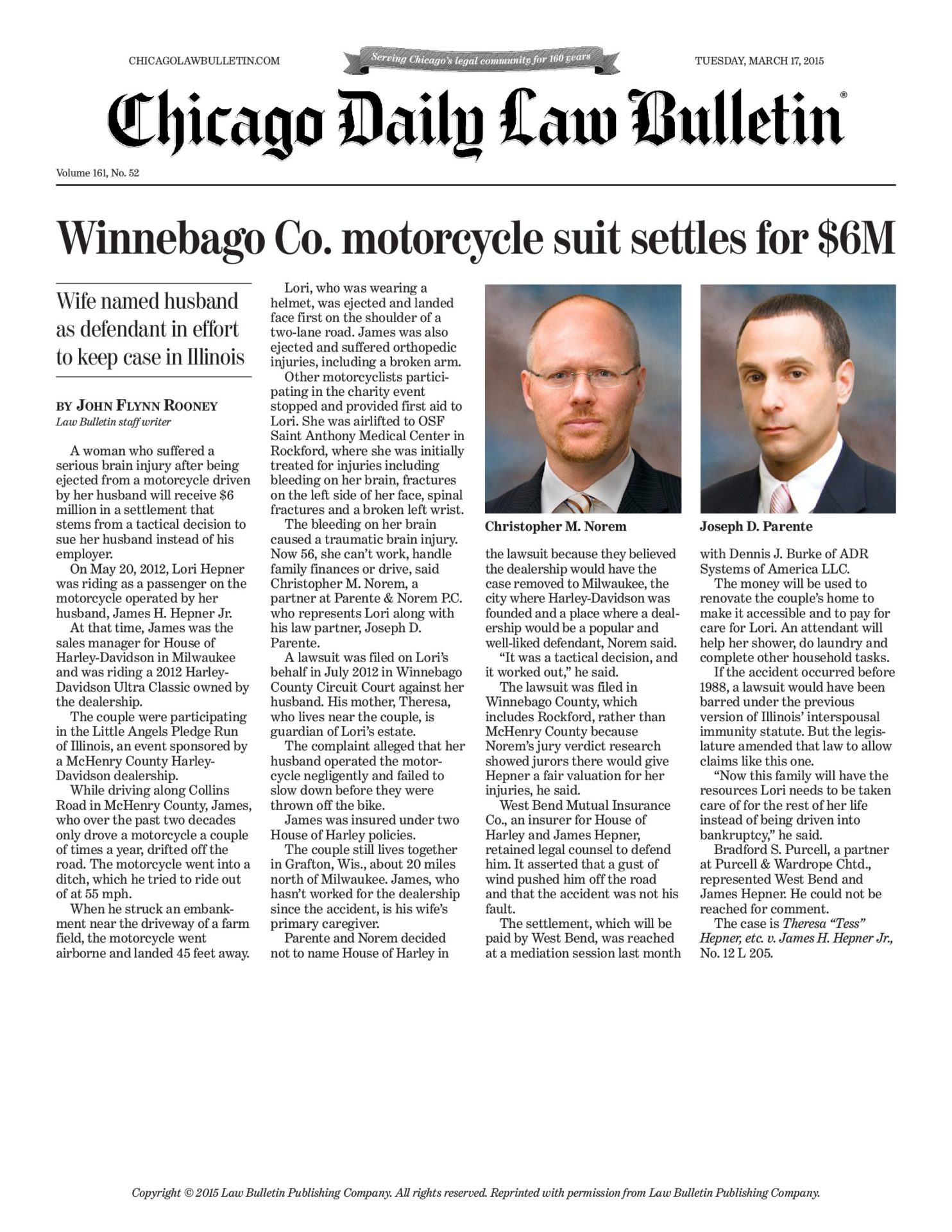
Winnebago Co. Motorcycle Suit Settles for $6M
BY JOHN FLYNN ROONEY Law Bulletin staff writer
A woman who suffered a serious brain injury after being ejected from a motorcycle driven by her husband will receive $6 million in a settlement that stems from a tactical decision to sue her husband instead of his employer.
On May 20, 2012, Lori Hepner was riding as a passenger on the motorcycle operated by her husband, James H. Hepner Jr.
At that time, James was the sales manager for House of Harley-Davidson in Milwaukee and was riding a 2012 Harley-Davidson Ultra Classic owned by the dealership.
The couple were participating in the Little Angels Pledge Run of Illinois, an event sponsored by a McHenry County Harley-Davidson dealership.
While driving along Collins Road in McHenry County, James, who over the past two decades only drove a motorcycle a couple of times a year, drifted off the road.The motorcycle went into a ditch, which he tried to ride out of at 55 mph.
When he struck an embankment near the driveway of a farm field, the motorcycle went airborne and landed 45 feet away.
Lori, who was wearing a helmet, was ejected and landed face first on the shoulder of a two-lane road. James was also ejected and suffered orthopedic injuries, including a broken arm.
Other motorcyclists participating in the charity event stopped and provided first aid to Lori. She was airlifted to OSF Saint Anthony Medical Center in Rockford, where she was initially treated for injuries including bleeding on her brain, fractures on the left side of her face, spinal fractures and a broken left wrist.
The bleeding on her brain caused a traumatic brain injury. Now 56, she can’t work, handle family finances or drive, said Christopher M. Norem, a partner at Parente & Norem P.C. who represents Lori along with his law partner, Joseph D. Parente.
A lawsuit was filed on Lori’s behalf in July 2012 in Winnebago County Circuit Court against her husband. His mother, Theresa, who lives near the couple, is guardian of Lori’s estate.
The complaint alleged that her husband operated the motorcycle negligently and failed to slow down before they were thrown off the bike.
James was insured under two House of Harley policies.
The couple still lives together in Grafton, Wis., about 20 miles north of Milwaukee. James, who hasn’t worked for the dealership since the accident, is his wife’s primary caregiver.
Parente and Norem decided not to name House of Harley in the lawsuit because they believed the dealership would have the case removed to Milwaukee, the city where Harley-Davidson was founded and a place where a dealership would be a popular and well-liked defendant, Norem said.
“It was a tactical decision, and it worked out,” he said.
The lawsuit was filed in Winnebago County, which includes Rockford, rather than McHenry County because Norem’s jury verdict research showed jurors there would give Hepner a fair valuation for her injuries, he said.
West Bend Mutual Insurance Co., an insurer for House of Harley and James Hepner, retained legal counsel to defend him. It asserted that a gust of wind pushed him off the road and that the accident was not his fault.
The settlement, which will be paid by West Bend, was reached at a mediation session last month with Dennis J. Burke of ADR Systems of America LLC.
The money will be used to renovate the couple’s home to make it accessible and to pay for care for Lori. An attendant will help her shower, do laundry and complete other household tasks.
If the accident occurred before 1988, a lawsuit would have been barred under the previous version of Illinois’ interspousal immunity statute. But the legislature amended that law to allow claims like this one.
“Now this family will have the resources Lori needs to be taken care of for the rest of her life instead of being driven into bankruptcy,” he said.
Bradford S. Purcell, a partner at Purcell & Wardrope Chtd., represented West Bend and James Hepner. He could not be reached for comment.
The case is Theresa “Tess” Hepner, etc. v. James H. Hepner Jr., No. 12 L 205.
———————————————————————-
CHICAGOLAWBULLETIN.COM // In the News
Volume 161, No. 52 // TUESDAY, MARCH 17, 2015
